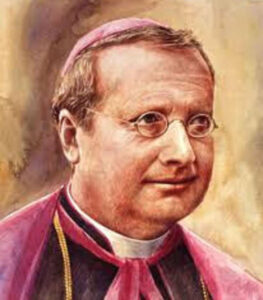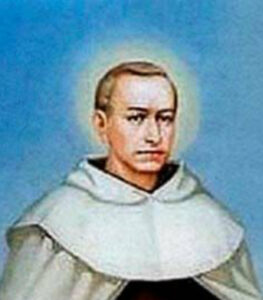November Saints

5 November
Saint Guido Maria Conforti
(1865-1931)
Guido Maria Conforti was born in Parma, Italy, the eighth of ten children. He attended an elementary school run by the De La Salle Brothers from 1872 and each day, on his way to the school, he would stop by the church of Santa Maria della Pace, where he used to have conversations with the crucified Christ. He later recalled, "I looked at him and he looked at me and seemed to say so many things."
Although his father would have preferred that he stay and manage the farm, Conforti enrolled in the seminary in Parma in November 1876. He began reading the works of Saint Francis Xavier, which inspired a desire to be a missionary, but his requests to join the Society of Jesus or the Salesians of Saint John Bosco were denied.
Conforti was ordained to the priesthood in 1888 at Fontanellato. He then served as a professor at the local seminary and became the Vicar-General of the Diocese of Parma in 1896.
In 1895, he established the Xaverian Missionaries, receiving the approval of Pope Leo XIII. In 1899, he sent the order's first missionaries to China. Appointed Archbishop of Ravenna in 1902, he submitted his resignation two years later due to his ill health.
In 1907, he became Bishop of Parma and travelled to many parishes on horseback to scrutinise his diocese. His particular focus was on religious education.
Conforti is said to have provided the initiative behind Pope Benedict XV's encyclical Maximum illud, issued on 30 November 1919. That document is called the Magna Carta of modern Catholic missionary work.
He travelled to China in 1928 to visit the Xaverian Missionaries and to observe the work they were doing.
Returning to Parma, he fell ill in October 1931, dying a month later.
Saint Guido, remind us always of our calling to be missionaries in our society.

19 November
Saint Raphael Kalinowski
(1835-1907)
Józef Kalinowski was born in 1835 in the city of Vilnius in Poland. His mother died a few months after he was born.
From the age of 8, Kalinowski attended the Institute for Nobles at Vilna, and graduated with honours in 1850, going on to the School of Agriculture at Hory-Horki.
He enlisted in the Imperial Russian Army in 1853, entering the Nicholayvev Engineering Academy, eventually helping to design the Odessa-Kiev-Kursk railway. Promoted to Captain in 1862, he was stationed in Brest, Belarus. The following year, Józef resigned from the Army, serving as minister of war for the January Uprising of the Poles in Vilna. When the Poles rose against the Russians in 1863, Józef joined them, was taken prisoner, surviving the forced march to slave labour in Siberia and becoming a spiritual leader to the prisoners. He was released ten years later.
In 1864, Russian authorities condemned Józef to death by firing squad but, afraid that he would be seen as a political martyr, commuted the sentence to ten years in Katorga, in the Siberian labour camp system. During 1871-72, he did meteorological research for the Siberian subdivision of the Russian Geographical Society. Authorities released him from Siberia in 1873 but exiled him from Lithuania. He moved to France, living in Paris.
Kalinowski returned to Warsaw in 1874, where he was appointed as a tutor to the sixteen-year-old Prince August Czartoryski, becoming a major influence on the young man, who later became a priest and was beatified by Pope John Paul II in 2004.
In 1877, he was admitted to the Carmelite Priory in Linz, becoming a Discalced Carmelite and being given the name of Raphael. He was ordained a priest in 1882, and in 1883 he became prior of the monastery at Czerna.
Kalinowski founded many Catholic organisations in Poland and Ukraine, most prominent of which was a monastery in Wadowice, Poland, where he was also prior. He also founded monasteries of Discalced Carmelite nuns in Przemyśl and Lvov.
From 1892-1907 Kalinowski worked to document the life and work of Mother Theresa Marchocka to assist with her beatification. He died of tuberculosis. in 1907.
Saint Raphael, help us to fulfil God’s will throughout our lives.
 Entries(RSS)
Entries(RSS)